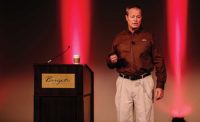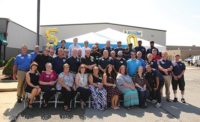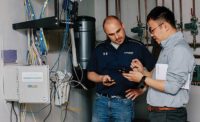Back in 2009, Pacific Plumbing Supply made an investment in a growing segment of the market: green, high-efficiency products.
The company repurposed a large part of their main facility in Seattle to display only their highest efficiency products, including condensing boilers, tankless water heaters, radiant heating components, solar thermal, and accessories. It quickly became known as the “Green Room.”
The concept was so well received by customers that Pacific now operates Green Rooms in three locations: North Seattle, South Seattle and Lacey, Washington.
Pacific uses these spaces to host a variety of training sessions, special events and presentations on the various incentive programs in their territory. The company has 12 locations throughout Alaska, Montana and Washington.
“The Green Room’s real strength is as a training venue,” says Jamal Picou, hydronic heating manager for Pacific Plumbing Supply. “For example, the South Seattle location hosts an average of 15 events each year. I think classes events help address the biggest challenge facing the hydronic industry in our area. We need more people skilled in hydronics specifically.”
Topics covered in Green Room training sessions include EPA regulations, boilers, heat pumps, mini-splits, Hydronics 101 and 201, pump-specific training and more. Pacific generally limits training events to 20 people so attendees have adequate time to ask questions.
“For example, Ric Mayo, one of Taco Comfort Solutions’ residential trainers, will conduct training sessions at two of our locations in June,” Picou says. “From time to time, Ridgeline Mechanical Sales provides training on U.S. Boiler Company’s Alta boiler and Fernox hydronic chemical additives.”
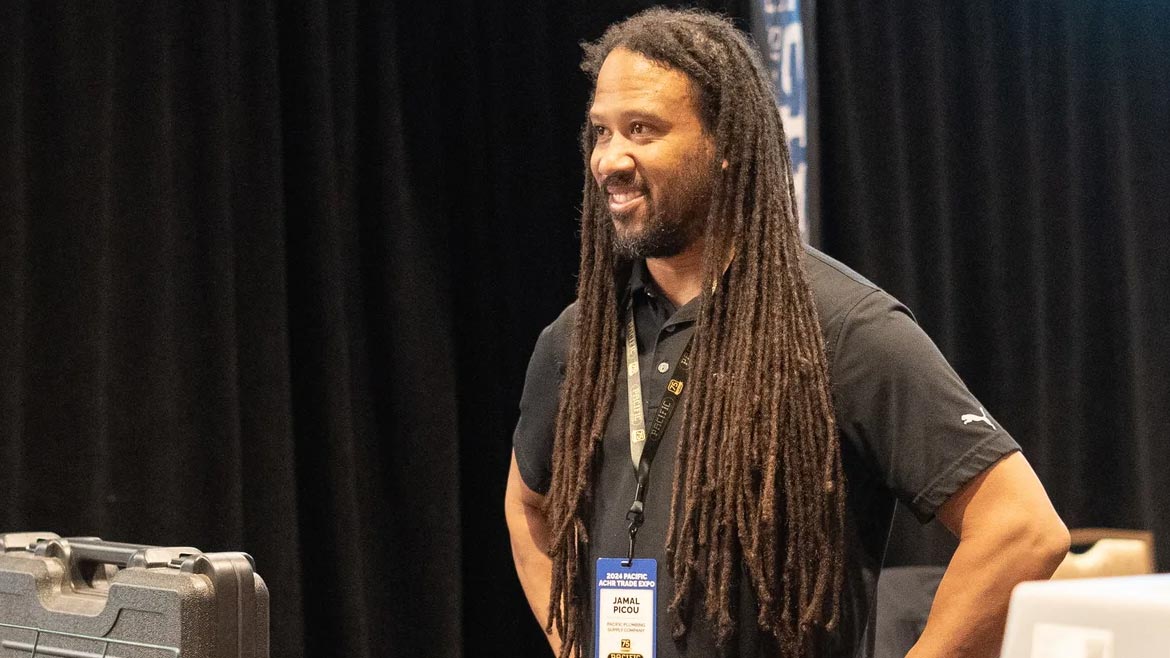
Pacific’s Jamal Picou.
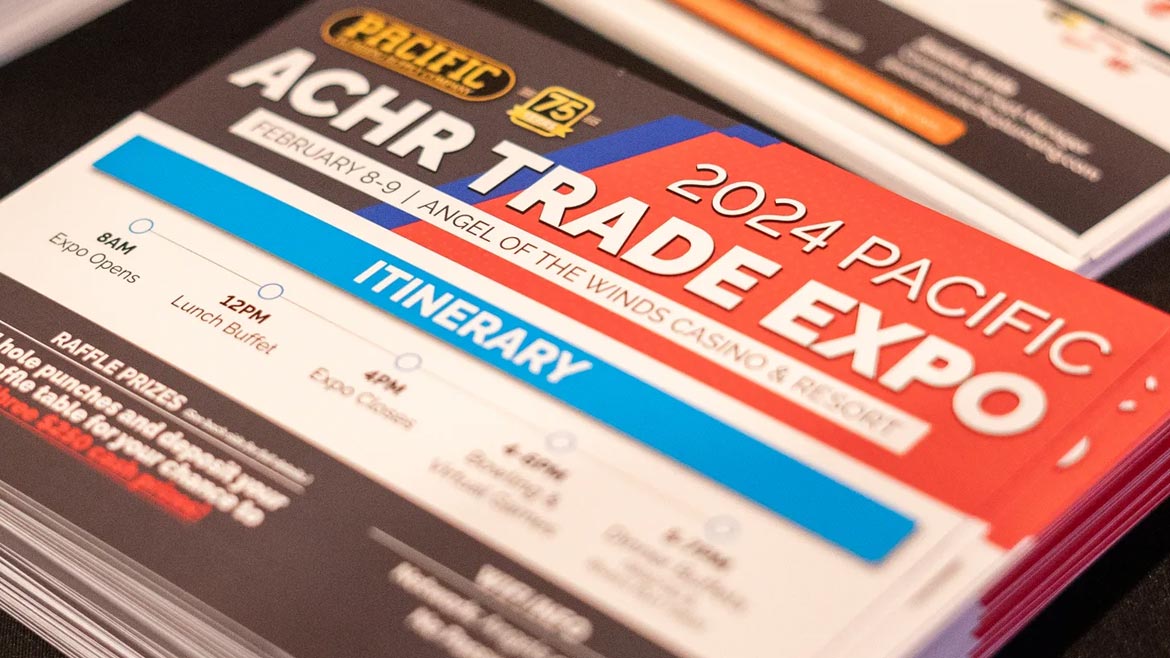
Pacific’s first ACHR Expo was held at the Angel of the Wind casino in Arlington, WA.
A hydronic specialist from California
Picou joined Pacific Plumbing Supply in August of 2021, after 17 years at Ferguson in northern California. Most hydronic specialists hail from New York and New England, or maybe from Pennsylvania or the Mid-west. A true wet head from California is rather uncommon.
At Ferguson, Picou started in the warehouse when he was 29, taking every opportunity to move up. He eventually found himself in inside sales. At the time, a large solar thermal manufacturer needed a contact person at a few different branches to help funnel contractors in the right direction. Picou became that contact at the San Fransisco branch and virtually dove into hydronics. That experience opened a door in Ferguson’s hydronic department.
“Looking back, specializing in hydronics was one of the best things I could’ve done for my career,” Picou explains. “I was in the hydronic department for over a decade before moving to Pacific Plumbing Supply.”
Dave Morrell, at Ridgeline Mechanical Sales, has a long history working with Picou from when he used to call on the California market.
“I really enjoyed working with Jamal,” Morrell says. “He’s laid-back, has great ideas, and his ability to execute on those ideas is fantastic.”
Today, Picou wears a few hats at Pacific. In addition to being the hydronic sales manager for Washington state, he’s also branch manager of the South Seattle showroom, and has worked continuously to keep the Green Rooms up to date with the latest technology. He creates loop layouts, collaborates with Pacific’s outside sales team, supports commercial quoting, and coordinates manufacturer and rep training sessions.
“Teaching hydronics can be like teaching a second language in a classroom filled with plumbers or air-side techs,” Picou says. “As soon as trade show season is over, I focus on our training season, which runs from March through August.”
Training is the second step in hydronic sales, at least in Washington. The first step is spreading awareness.
Awareness is exactly what Picou and Dan Sherman, an owner of Pacific, were discussing over lunch one day during the summer of 2022 when they hatched a new idea.
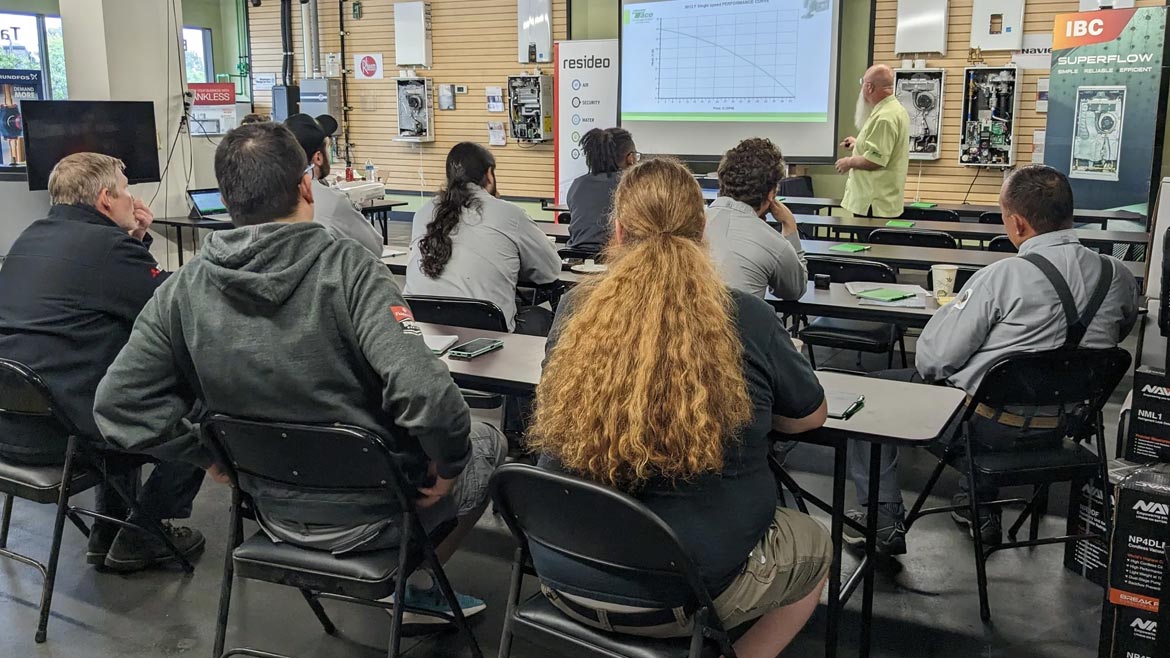
Ric Mayo, one of Taco Comfort Solutions’ residential trainers, conducts a class at The Green Room.
Not just any trade show
“We had this concept for a regional expo to showcase high-efficiency heating and cooling equipment,” Picou says. “We didn’t envision it as a selling event, like other regional shows. Instead, we wanted to put the right contractors in front of cutting-edge equipment and in touch with the manufacturers and reps who could train them on proper installation.”
The Pacific CEO, Ron Abramson, and the executive team reviewed the plan and agreed that if they were going to do it, they had to do it right. Yet, the question remained: Where would the ROI come from if it wasn’t a selling show?
“Instead of generating sales, the goal was to book training sessions,” Picou says. “If the awareness and skills are there, sales will follow and everyone benefits, even the consumer. No, especially the consumer.”
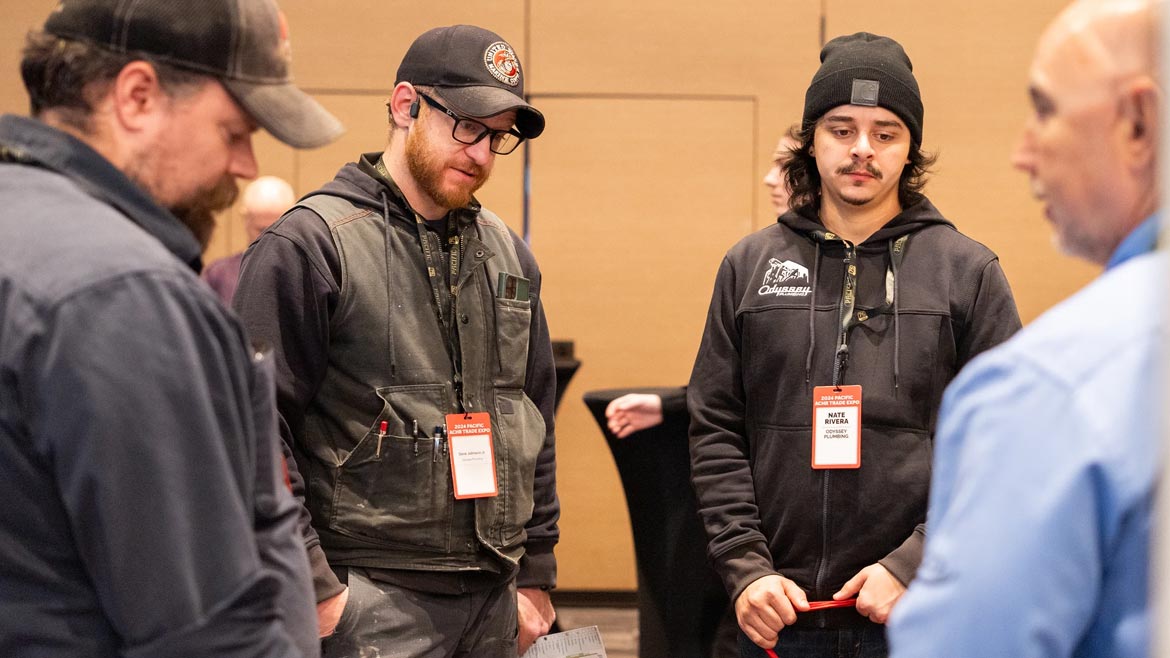
The show provided great networking opportunities and allowed many attendees to put faces to names.
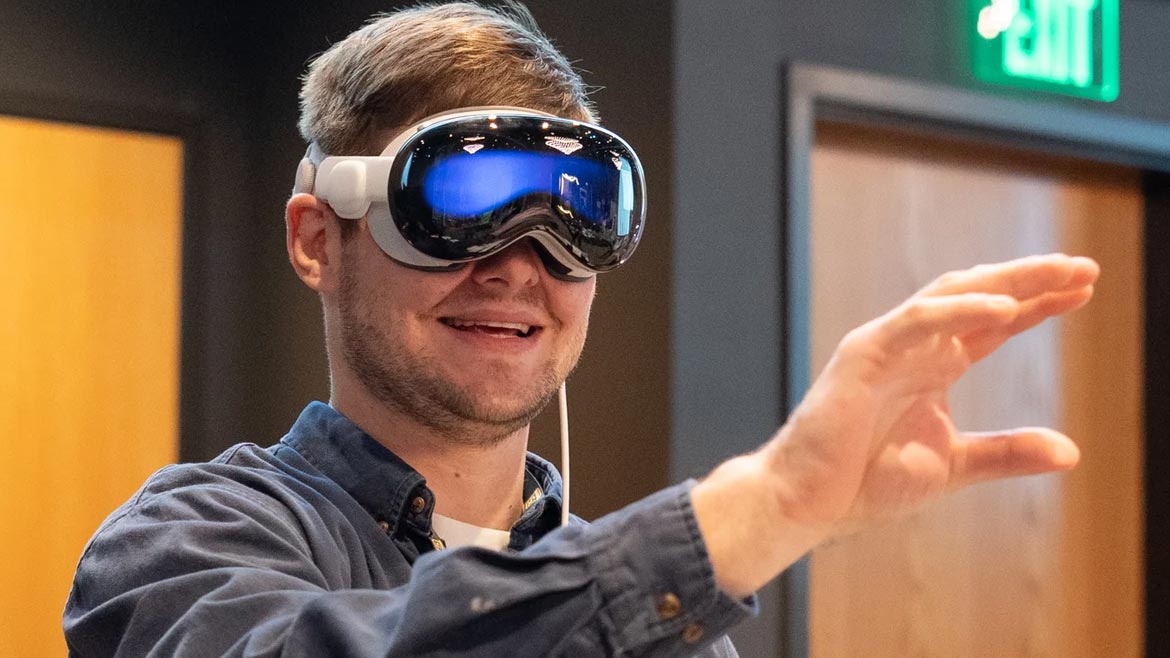
Puget Sound Energy’s Daniel Snyder disappears into a VR world.
After months of discussion and a year of planning, the first Pacific ACHR Expo was held on February 8 and 9 at the Angel of the Wind casino in Arlington, Washington. More than 300 contractor attendees showed up, some travelling from Montana and Alaska. The landmark event took place during Pacific’s 75th year in business.
The right conversations
“It was the best trade show I’ve participated in,” Morrell says, who was joined at the expo by four other Ridgeline reps. “The contractors were super engaged and specifically interested in the technology on display. There were no tire-kickers and it wasn’t overly crowded, so there was a lot of interaction between manufacturers, reps and contractors.”
The event was all about learning. As contractors moved around the show floor, they signed up for the training events that interested them. Each booth had a sign-up sheet, and now it’s up to Picou to coordinate the training sessions.
“Jamal is a very smart, savvy guy,” says Chris Mitchell, director of sales for U.S. Boiler Company. He, Sherman, and the whole Pacific team worked their tails off to make the show happen, so I wasn’t surprised that it turned out as well as it did. There were no surface-level conversations with installers. You could tell they came to learn. We got great feedback on the Alta condensing boiler and lots of interest in our new Ambient Electric Boiler.”
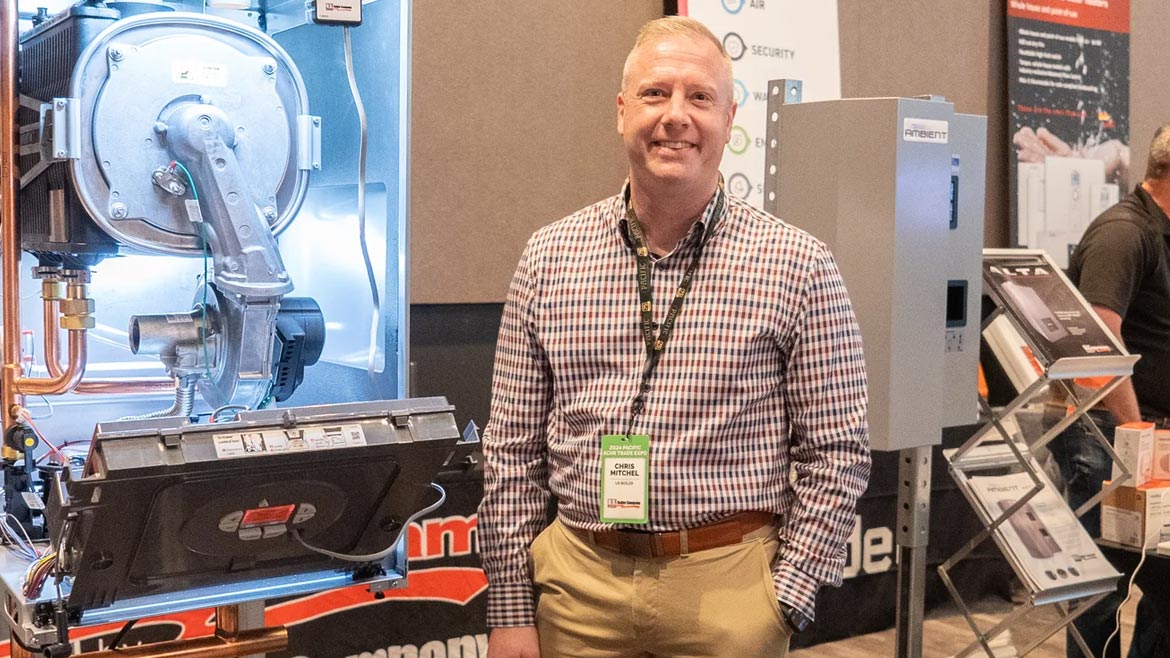
US Boiler Company’s Chris Mitchell brought the Alta condensing boiler and Ambient Electric boiler to the expo.
“The show was a fantastic opportunity to put faces to names,”says Nick Hollobon, hydronic sales engineer at Proctor Sales Inc. “I also met high quality potential customers across the board, from installers to rebate organizers.”
“Hydronic-based training tends to be underserved in our market, so it was great to see Pacific lead with the education component,” Hollobon continues. “The interest we received in Taco’s ECM circulators and tekmar’s new 294 boiler control were evidence that the market is thirsty for hydronic info. More than a few commercial installers got excited when they learned they can control multiple boilers of different brands in a single system with the tekmar 294, let alone the ability to control hydronic heat pumps.”
Picou credits the success of the show to a monumental team effort on the part of everyone at Pacific.
“The Pacific marketing team coordinated everything perfectly,” Picou says. Dan and Ron made the show our number one priority for months ahead of time, and there were a dozen other people involved at a high level. We spent a lot of time on Microsoft Teams meetings to make the concept a reality!”
Where the industry is headed
The Plumbing-Heating-Cooling Contractors Association (PHCC) was onsite with a podcast booth, interviewing attendees and exhibitors on various topics.
“PHCC interviewed me, among many others,” said Mitchell. “The conversation covered industry changes and what’s new at U.S. Boiler Company. The biggest thing I see in hydronics right now is the changing regulatory environment, with natural gas moratoriums appearing on both Coasts. U.S. Boiler’s stance is that we want to remain hydronic leaders, regardless of regulation. That’s why we developed the Ambient electric boiler and the Ambient air-to-water heat pump. Washington is taking a very aggressive stance against fossil fuel use, so the conversation was timely and pertinent in Seattle.”
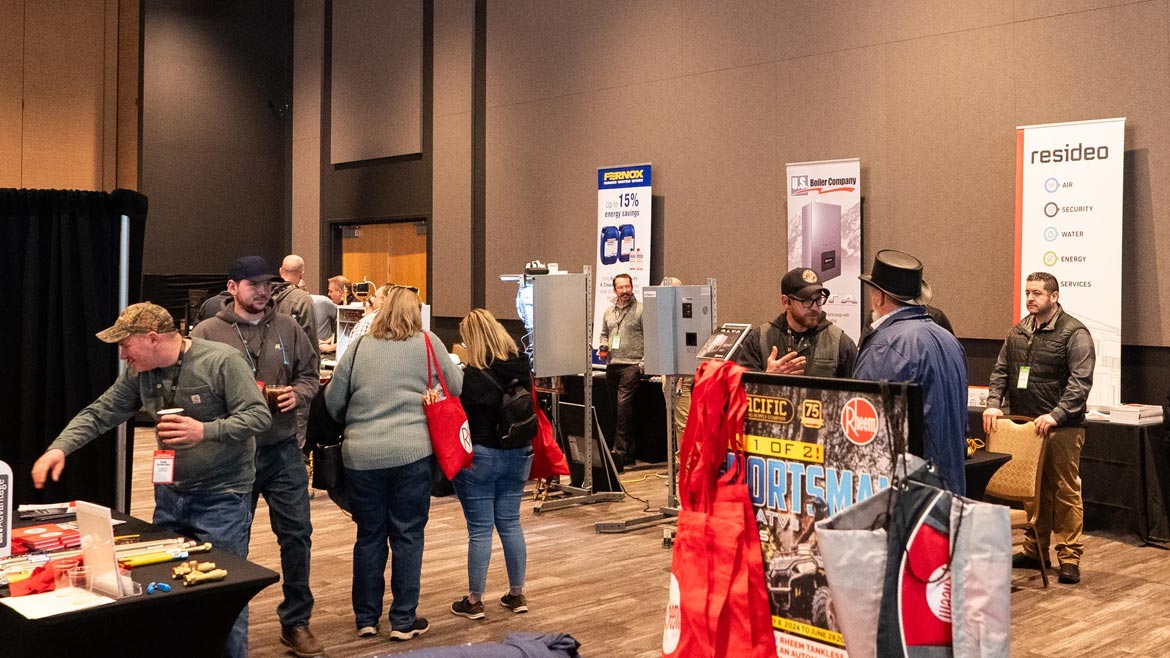
The expo had just the right amount of traffic to facilitate great discussions.
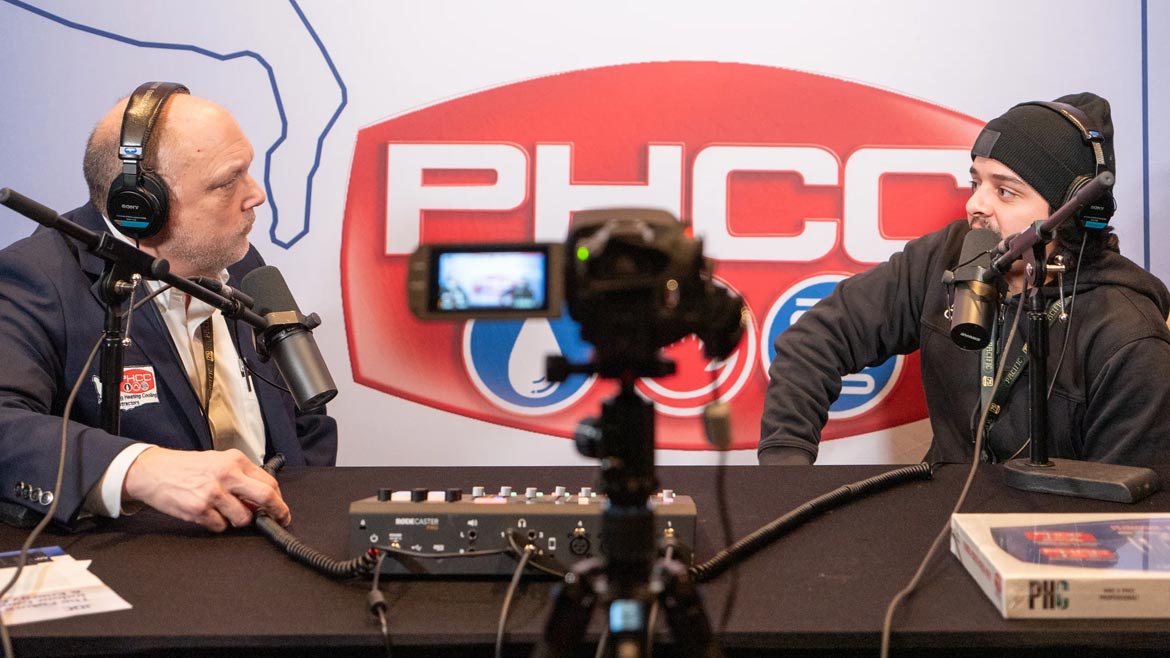
PHCC brought their mobile podcast studio to the show!
According to Picou, the move toward heat pumps is taking many of Pacific’s customers by surprise. It’s not business as usual. For example, new construction projects in King County can’t connect to natural gas lines.
“Installers in the Seattle area will either get onboard with heat pumps or they’ll become dinosaurs,” Picou says. “It’s our job to keep them relevant. If they know they can come to us for advice and training, they’ll also come to us for product. We’re creating loyalty through exposure and education. We want to lead in education.”




